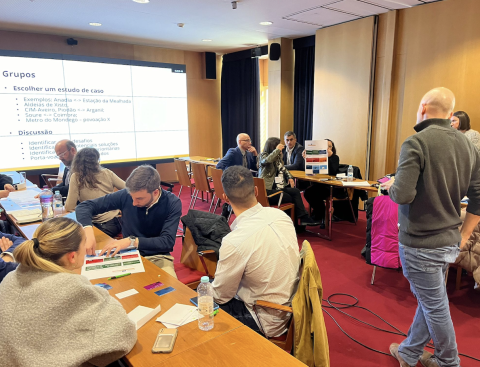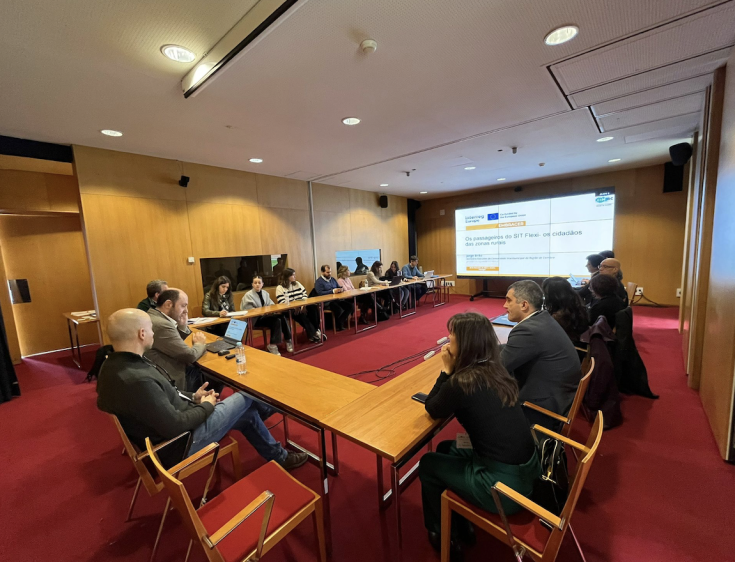2nd Stakeholder meeting for Centro Region in Aveiro!
The 2nd Regional Stakeholder Group Meeting of the EMBRACER Project, held at the University of Aveiro (UA), Portugal, aimed to discuss and address the challenges and innovative approaches of mobility between urban and rural areas in the Centro Region of Portugal. The meeting brought together more than 25 participants, including relevant players such as representatives of the Managing Authority, Institute of Mobility and Transport, Intermunicipal Communities, Municipalities, public transport operators, and researchers.
The meeting was an opportunity to share the vision of the EMBRACER project with the invited stakeholders, as well as to offer a forum for discussion on the (common) challenges and possible solutions for improving mobility in the Centro Region. The agenda featured a line-up of interesting presentations and inspiring contributions to discussion, including:
Jorge Bandeira, from UA, outlined the project's vision and objectives, followed by an introductory welcome note by Antonio Bastos, coordinator of the Center for Mechanical Technology and Automation, UA, who emphasised the importance of regional collaboration between the most diverse entities in order to smoothly overcome challenges and focus on the improvement of citizens' quality of life.
Bernardo Campos, from CCDR-Centro, highlighted the timeless nature of regional mobility challenges, focusing on regional development strategies related to mobility, and noticed how rural and regional mobility has been a relevant topic since the Roman Empire, in which connecting communities and facilitating the movement of people and goods has been a central concern that continue to be addressed nowadays. The Centro Region’s focus on important investments in digitalisation of mobility, with real-time information systems, synchronisation of public transport with services schedules, and multimodal transport centers, represents a significant evolution. However, administrative boundaries were found to be one of the main challenges to seamless regional mobility: these often create fragmented systems with varying regulations and operational practices, and yield increased costs and reduced overall efficiency in the mobility network.
CIM - Coimbra Region (Jorge Brito) and CIM - Viseu Dão Lafões (Nuno Martinho) secretariat executive officers shared insights on regional mobility challenges and opportunities, namely related to innovative DRT systems that are implemented in Coimbra (SITFLEX) and Viseu (IR e VIR) regions. Despite some challenges related to the legal constraints on the operation since taxis serving the region were incorporated in the loop to take an active role in these mobility systems, the initiatives are truly focused on the citizens needs and users pay for the service as a normal public transport ticket, which sometimes does not fully covers the service operations and thus, these are supported by the public authority budget. The common speech emphasised that this is a rare example of a policy that is truly focused on the citizen, and that it is vital to involve key pillars of the community in spreading the word about these mobility solutions to promote trust among the communities.

Following the networking coffee-break, stakeholders from the Centro Region participated in a dynamic World Café format discussion aimed at improving sustainable mobility in suburban and low-density areas. The iterative format allowed for a focused exploration of key challenges, good practices, and necessary incentives. The outcomes of this session include:
Challenges: Discussions pinpointed dispersed land use, low density, unbalanced demand, and behavioral inertia as major obstacles to efficient and sustainable mobility.
Good Practices: Carpooling lanes, intermodal bike-sharing connected with mass transit, DRT with real-time optimisation, and the integration of ride-sharing platforms were highlighted by stakeholders as relevant solutions to improve the mobility system in a more effective and sustainable way.
Incentives: Participants stressed the need for clearer legislation and financial support for digitalising the mobility sector.
The EMBRACER RSGM in Centro Region, Portugal, was very important for the participants for networking and put a collaborative effort towards addressing the challenges of regional mobility, particularly in bridging the gap between urban and rural areas. Key take-home messages for addressing the problem of underserved communities requires:
• a comprehensive approach, that integrates the potential of digitalisation to improve the mobility service, focuses on citizen-centric innovative solutions, and harmonizes policies and regulations across regions to improve the operational activity;
• an effective regional collaboration; and
• continued investment either in terms of legislation or financial support.
